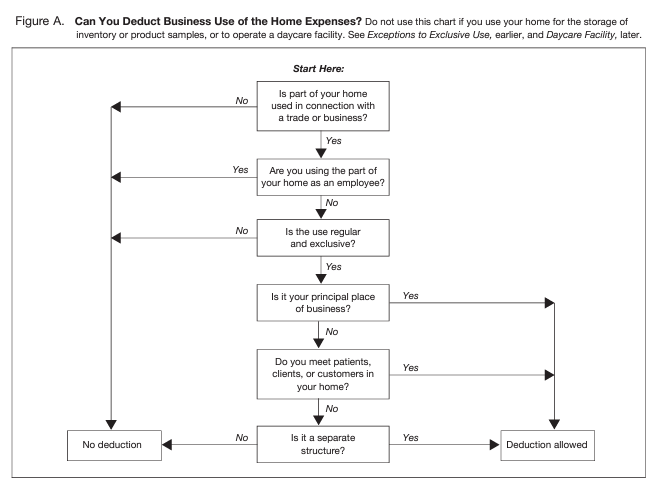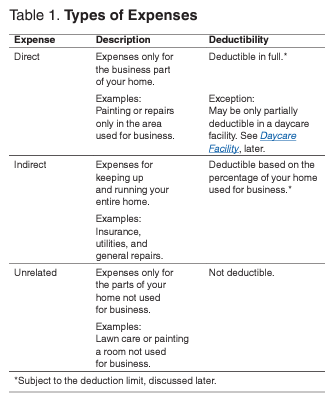Overview
You might be able to claim a significant tax deduction for the business
use of your space. If you're working from the comfort of your own home,
whether that's a cozy apartment, a sprawling house, or even a unique
living space like a boat, you might be able to save on taxes.
What does it take to qualify? Whether you're storing inventory or using
a part of your home as an office, there are specific criteria to meet.
Daycare providers, you're in for some special rules tailored just for
you.
Once you qualify, you're ready to calculate your deductions. There are
two ways to do this: the detailed route of itemizing actual expenses or
opting for the simplified method, which will save you time and
paperwork.
This brief on
IRS Publication 587, Business Use of Your Home, speeds up securing your home office deduction. Pub 587 is 34 pages
long. This is compressed so refer to the official publication when
making decisions for the most up-to-date policies and procedures.
What you'll learn...
- Qualifying for a Deduction
- Figuring the Deduction
- Recordkeeping
Qualifying for a Deduction
To claim deductions for the business use of your home, you must meet
specific criteria. Normally, common home expenses like mortgage
interest, real estate taxes, and utilities aren't deductible as business
expenses. But, if part of your home is used exclusively and regularly
for business purposes, you may be eligible for deductions. This includes
using your home as your principal place of business, meeting clients or
customers, using a separate structure on your property, or using your
home for storage related to your business.
- Exclusively and regularly as your main place of business
-
Exclusively and regularly for meeting clients or customers in your
trade or business
-
For a separate, unattached structure used in connection with your
business
- Regularly for storage of inventory or product samples
- For rental purposes (see Pub. 527)
- As a daycare facility

Exclusive Use Test
To qualify for the home office deduction under the exclusive use test, a
specific area of your home must be used only for your trade or business.
This area could be a room or another defined space, and it doesn't
require a permanent partition to qualify. However, if the space is used
for both business and personal activities, it does not meet the
exclusive use criterion.
For example, if you are an attorney using your home den to write legal
briefs, but your family also uses it for recreation, you cannot claim a
deduction for its business use.
Exceptions to the Exclusive Use Test
- Operate a wholesale or retail business,
- Store inventory or product samples at home for business use
- Have your home as the sole fixed location of your business,
- Use the storage space regularly,
- Utilize a separately identifiable area suitable for storage.
For instance, if you sell mechanic's tools and use half of your basement
for storage while occasionally using it for personal purposes, you can
still deduct expenses for this space.
If you use part of your home as a daycare facility, the exclusive use
requirement does not apply.
Outside of these two exceptions, any part of your home used for business
must pass the exclusive use test to qualify for deductions.
Regular Use Test
To meet the regular use test, you need to use a designated area of your
home for business activities on a consistent basis. Using the space
occasionally is not enough. When determining if your usage qualifies as
regular, you should assess all relevant facts and circumstances. Regular
use is key to establishing that part of your home is genuinely dedicated
to your business activities.
Trade or Business Use Test
To pass the trade-or-business-use test, you must use a portion of your
home specifically for your trade or business activities. Simply engaging
in profit-seeking activities does not qualify unless they are part of an
established trade or business.
For example, if you use a part of your home to read financial
periodicals and engage in investment-related activities for personal
investment purposes, and not as a professional broker or dealer, these
activities do not qualify as a trade or business. Therefore, you cannot
claim a home office deduction. This test emphasizes the need for the
space to be used in connection with a genuine business operation.
Principal Place of Business Test
-
Relative Importance: Consider the importance of the activities
performed at your home compared to other locations where you conduct
business.
-
Time Spent: Assess how much time you spend working from each business
location.
-
You use it exclusively and regularly for the administrative or
management tasks of your business.
-
There is no other fixed location where you conduct substantial
administrative or management activities for your business.
A Home Office for More Than One Trade or Business
Your home office can serve as the principal place of business for more
than one distinct trade or business. However, it's important to evaluate
each business activity separately to determine if the office qualifies
as the principal place of business for each.
-
As the principal place of business for one or more of your trades or
businesses.
-
As a location to meet or deal with patients, clients, or customers in
the normal course of your business activities.
-
If the office is a separate structure on your property, it must be
used in connection with your trades or businesses.
Home Office Expenses for Meeting Patients, Clients, or Customers
-
Physical Meetings: You must physically meet with patients, clients, or
customers in your home.
-
Substantial and Integral Use: The use of your home for these meetings
must be substantial and integral to the operation of your business.
This requirement is typically met by professionals like doctors,
dentists, attorneys, etc., who maintain offices in their homes
specifically for these purposes. However, merely using your home for
occasional meetings or telephone calls does not qualify for home office
deductions. Importantly, the area used for meetings does not need to be
your principal place of business, but it must be used exclusively and
regularly for business meetings.
Figuring the Deduction
There are two ways for figuring your home office deduction: the
simplified method and using actual expenses. You can choose which one to
use each year meeting applicable requirements.
Using the Actual Expense Method to Calculate Deductions
-
Determine the percentage of your home used for business purposes.
-
Calculate the actual expenses associated with that portion, such as
utilities, rent, insurance, and depreciation.
- Applying any limitations on the deduction amount.
Part-Year Use: You can only deduct
expenses for the part of the year your home was used for business. For
example, if you start using your home for business on July 1, only
calculate your expenses from July to the end of the year for your
deduction.
Calculating Deductions for Actual Expenses
When using actual expenses, you must allocate the costs between personal
and business use.
Type of Expense: Is it a direct expense
(solely for the business part of your home), an indirect expense (for
keeping up and running your entire home), or unrelated to the business
use of your home.
Business Use Percentage: The percentage
of your home used for business is used to calculate indirect expenses
you can allocate towards your home office deduction.

Calculating Business Percentage of Home Use
To accurately claim home office deductions, it's essential to determine
the business percentage of your home. This percentage is based on the
proportion of your home that is used for business activities and is
crucial for calculating the deductible portion of home operating
expenses.
Methods for Determining Business Percentage
Use any reasonable method to determine the business percentage. Here are
two common approaches:
Area: Calculate the area (l*w) of the
space then divide it by the total area of your home. For example, a home
office is 100 square feet (10’ x 10’) and your total home area is 1000
square feet, your business percentage is 10%.
Room: If the rooms in your home are
approximately the same size, divide the number of rooms used for
business by the total number of rooms. For example, you use one room as
an office and your home has ten rooms, your business percentage is 10%.
Understanding the Limitations
It's important to understand how gross income from your business affects
the deductible amount of your home office expenses.
Full Deduction Eligibility: If the gross
income from your home-based business equals or exceeds your total
business expenses (which include depreciation), you can deduct all your
business expenses related to the use of your home.
Deduction Limitations: However, if your
business's gross income is less than your total business expenses, the
amount you can deduct for certain home-related expenses may be limited.
First, take the gross income from the business use of your home…
- Mortgage interest
- Real estate taxes
-
Casualty losses related to a federally declared disaster (if you
itemize deductions on Schedule A (Form 1040), or net qualified
disaster losses if you claim the standard deduction).
- Business phone expenses
- Office supplies
- Depreciation on business equipment
After subtracting these amounts, the remaining limit is what you can
claim for otherwise nondeductible home expenses such as utilities,
insurance, and home depreciation. Depreciation of the home is calculated
last.
Using the Simplified Method to Calculate Deductions
The simplified method offers an easier way to calculate your home office
deductions without needing to track and allocate actual expenses. With
this method, you calculate your deduction by applying a set rate of $5
per square foot to the area of your home that's used for business. The
maximum area you can use for this calculation is capped at 300 square
feet. This straightforward approach minimizes the complexity involved in
documenting and substantiating your home office expenses.
Implications of Choosing the Simplified Method
-
Exclusion of Actual Expenses and Depreciation: Choosing the simplified method means you cannot deduct actual
expenses related to the business use of your home, such as utilities,
repairs, or depreciation. The depreciation deduction for the portion
of the home used for business is considered zero for the year.
-
Non-Business-Related Expenses: Mortgage
interest, real estate taxes, and casualty losses should be treated as
personal expenses under the simplified method. If you rent part of
your home, these expenses must still be allocated between the rental
and personal use, which includes the business use calculated using the
simplified method.
-
No Deduction or Carryover of Disallowed Actual Expenses: If you previously used actual expenses for your home office
deduction and some of that deduction was disallowed, you cannot deduct
the carried-over amount in the year you choose the simplified method.
Instead, this disallowed amount must be carried forward to future
years when you might switch back to using actual expenses for your
deduction.
Switching back to actual expenses in subsequent years requires using the
appropriate depreciation tables for Modified Accelerated Cost Recovery
System (MACRS) to calculate depreciation. This approach to home office
deductions simplifies the process for some but may lead to different
financial outcomes depending on your specific expenses and business use
of the home.
Recordkeeping
-
Proof of Expenses: Preserve all
canceled checks, receipts, bills, and other documents that verify the
expenses you're claiming.
-
Usage Details: Your records should
clearly indicate the portion of your home used for business purposes.
-
Nature of Use: Document that you use
this part of your home exclusively and regularly for business, either
as your main place of business or as a place where you meet clients or
customers in the normal course of your business. Remember to note any
exceptions to the exclusive use requirement as discussed previously.
-
Depreciation and Other Expenses: Keep
detailed records of depreciation claimed and all other expenses
related to the business use of your home.
-
3 years after the date you filed your
return or the return's due date.
-
2 years after the date you paid the
tax.
-
Depreciable Basis needs records showing
the purchase price, the cost of any improvements, dates of purchase,
and how you acquired your home. These records are essential for
calculating depreciation.
-
Forms and Worksheets to retain are
Forms 8829 or the Worksheet To Figure the Deduction for Business Use
of Your Home, which can serve as records of your depreciation
calculations.
For more detailed guidelines on recordkeeping practices, refer to IRS
Publication 583, "Starting a Business and Keeping Records." By keeping
accurate and comprehensive records, you can ensure that you are prepared
to substantiate your home office deductions in the event of an IRS
inquiry or audit.


